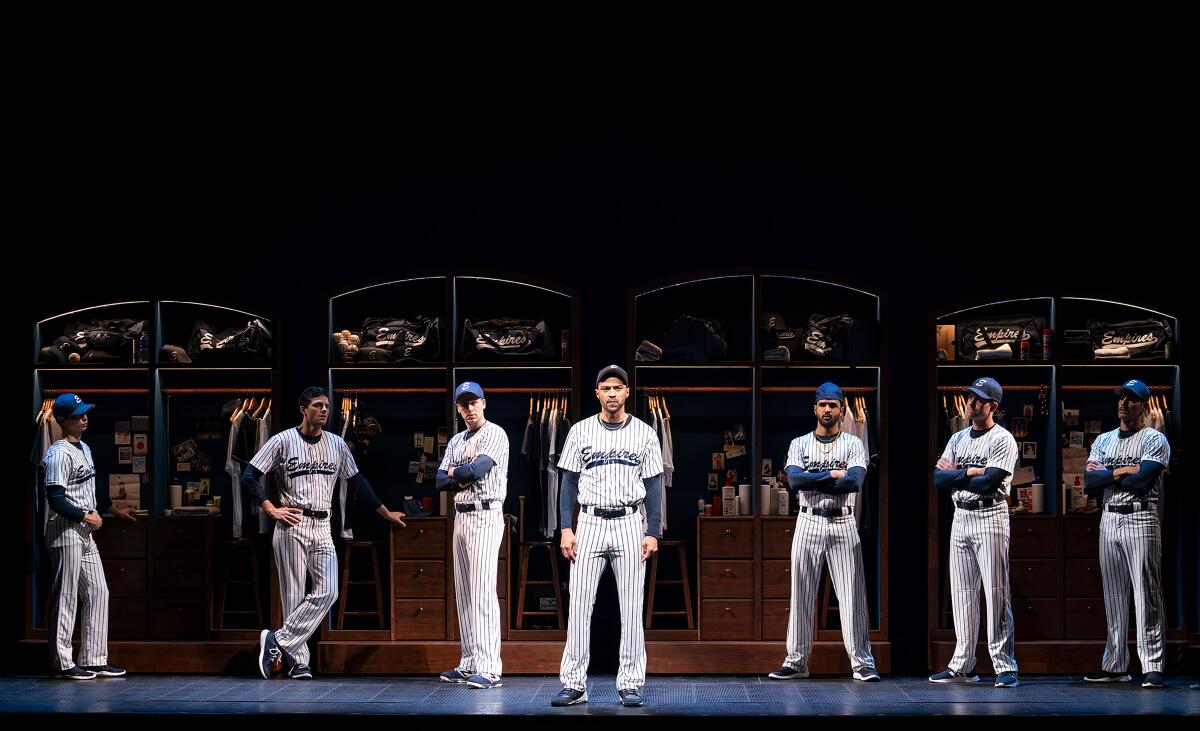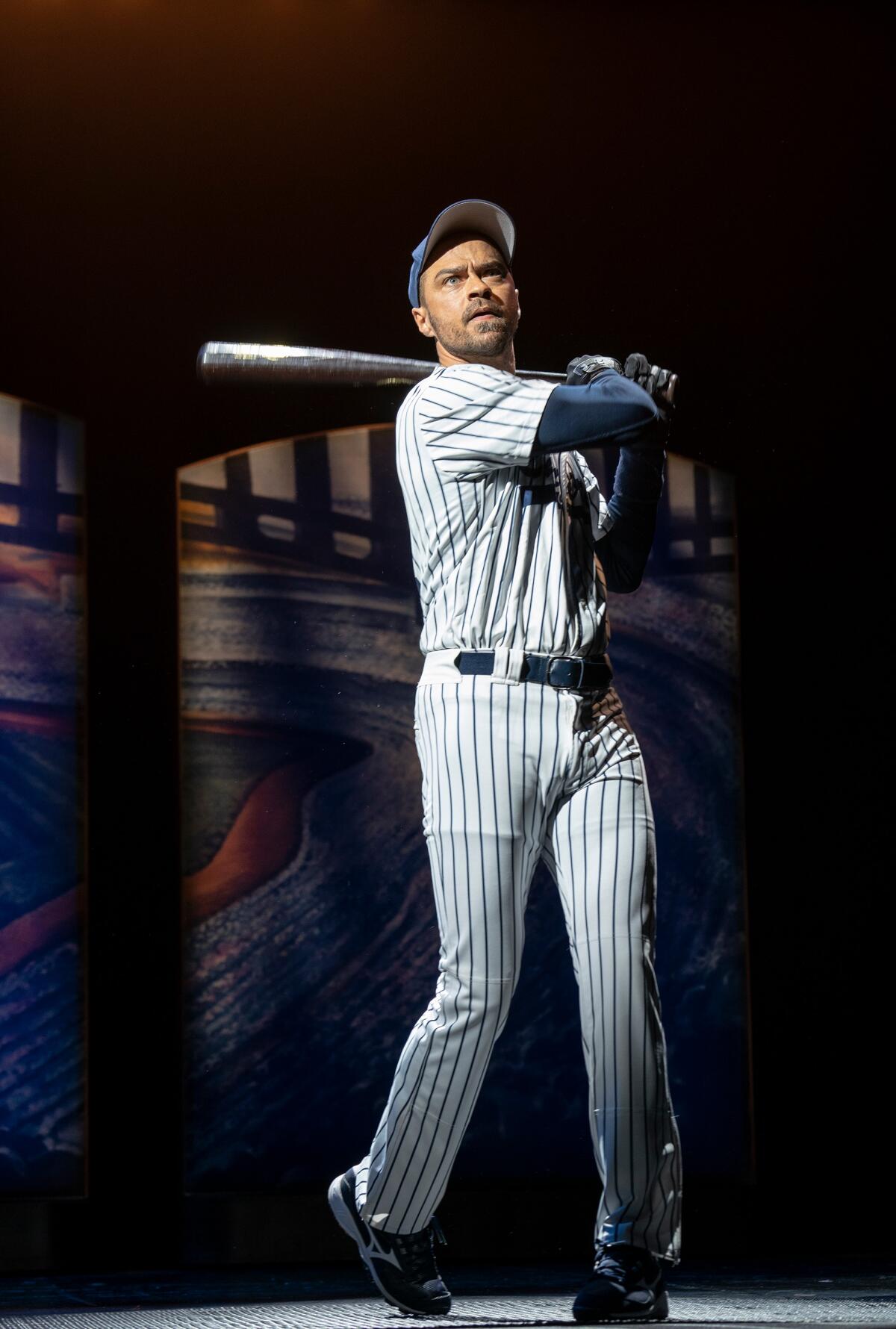Jesse Williams and Patrick Adams hope audiences will leave ‘Take Me Out’ inspired to live ‘their truth’

- Share via
NEW YORK — The new Broadway revival of Richard Greenberg’s Tony-winning play, “Take Me Out,” features two veterans of New York theater, Jesse Tyler Ferguson and Brandon Dirden. But the show’s lineup is built around two rookies, with actors Jesse Williams and Patrick J. Adams both making their Broadway debut. Williams also is set to star in a planned limited series adaptation of the play.
In “Take Me Out,” which opens April 4, Darren Lemming (Williams) is the biracial superstar of the defending World Series champion New York Empires. His charmed life is upended when he comes out as gay, brushing off the concerns about the possible reactions raised by his closest friend on the team, Kippy Sunderstrom (Adams).
While they’re newcomers to Broadway, both Williams and Adams drew from experiences in their own lives to embody the roles of Lemming and Sunderstrom, respectively: Williams spent years playing competitive baseball and has appeared in dramatic roles on the likes of “Grey’s Anatomy.” Adams’ own TV bona fides, including a turn on “Suits” as well as numerous stage appearances in Los Angeles-area theaters, gave him the chops to play Sunderstrom.
In Southern California, Adams most recently starred in the Old Globe Theatre’s world-premiere production of Anna Ziegler’s “The Last Match,” and he also produced and starred in “9 Circles” at the Bootleg Theatre, for which he was awarded a Backstage Garland Award for best performance in a play and was nominated for a 2012 Los Angeles Drama Critics Circle Award for lead performance.

While much has changed since “Take Me Out” debuted two decades ago, including the legalization of gay marriage, it’s still a rarity for professional male athletes to come out. “We hope the play can at least draw attention to all that hasn’t changed,” Adams says, sitting with Williams recently in Broadway’s Helen Hayes Theatre, where the show is running. “If we can contribute to people living their truth, that would be great,” Williams adds.
This interview has been edited for length and clarity.
You have a nice swing, Jesse.
Jesse Williams: Thanks. I appreciate it.
Patrick Adams: I have a swing later in the show toward the back of the stage and I always hope nobody is watching. I’ve asked Jesse for tips but I’m never quite as good. I wasn’t much of a sports guy.
What drew you to tackle Broadway?
Williams: I was ready to do something other than television, to go outside of my comfort zone, to go on an adventure and be really scared and learn and fall and make mistakes. But it was daunting as hell.
Adams: Theater had been a big part of my life for a long time and then I started doing more television but I always tried to come back to theater.
I’d never done theater in New York, so coming to Broadway was part of the appeal. I’d auditioned for things here but I think sometimes when you’re an actor from L.A., even if you’re a theater actor, it takes some time to educate people about you. I hadn’t really come close to getting anything.
Also, I don’t talk about this a lot but the last time I did theater I experienced immense panic and stage fright, so theater was something I thought might be in the rearview. But I realized there’s something about having to face that fear that was really important to me.
What appealed to you about “Take Me Out”?
Adams: All I knew about “Take Me Out” was that it was the naked baseball play. I immediately thought “no” because I’m the last person in the world who wants to be naked in front of 500 people. But I read the play and it was so good and I thought, “If I say no to this, then I must not want to do theater.” So I had to come to New York.
Williams: The play was a perfect fit for me. Not only is it objectively good and smart but baseball played a big role in my life — it was a real connective tissue for me and my father, it was a major part of my upbringing. And I could relate to what the characters go through, not just because of baseball but issues about identity and the projections onto your identity made by others.
Jesse Tyler Ferguson and Brandon Dirden are New York stage veterans. Did you look to them for guidance?
Williams: Yes. I’m constantly peppering them with questions. I’ll take any advice. With them there are no dumb questions. Everyone is so damn humble and generous. There’s a lot of positive reinforcement. Brandon and I have these intimate, emotionally consequential scenes and I look to him as an elder of sorts.
Adams: A lot of people in your position, Jesse, would be afraid to take too many notes but your capacity to say “What have you got?” is phenomenal. I can only process this many things.
Williams: I’m an information junkie.

You started working on the play before the world shut down. How does that impact your performances?
Williams: When we returned two years later, I felt more emotionally mature and available. The character just sat there but I’ve grown and now see some of my own BS more clearly.
Adams: That’s true. I feel like a different person. I had a baby during the pandemic. I was taking a look at myself in all sorts of ways.
And the world has changed — people appreciate that desire to be in rooms together. The audiences are tremendous so far, so supportive and right there with us, more than any other play I’ve done. You can feel the audience’s excitement about getting to share a space together. It’s something I took for granted before but now it feels ceremonial and has a magical quality and gives me a real sense of gratitude.
On your first night in front of a Broadway audience, were you thrilled or did you think, “What have I gotten myself into?”
Adams: The first night of previews on Broadway was one of the great nights of my life.
Williams: Every night I have both of those feelings. It’s a high-wire act. There are times when it feels euphoric and then there are times when you think, “I’m going to destroy everything we’ve built.”
Adams: Theater actors train their whole lives, and Jesse’s capacity to learn the lessons about surfing the moment is phenomenal, which is a gift to the whole cast — it’s something I still struggle with.
Patrick, how is your stage fright going?
Adams: I’m dealing with anxiety every day but I have tools now, which I didn’t have before. Sometimes they work great, some days they don’t. Part of anxiety is the feeling that if you screw up and go an inch to the left, you’re off the high wire and you’re a dead man. That’s how I used to operate onstage, with a lot of fear and needing to be perfect. I’m trying to get away from perfect.
I wish I could wake up one morning and the anxiety would be gone, but some people say when that happens you’re in trouble. I need the right amount of anxiety and then I have to accept it, instead of fighting it or running from it as I have been.
Williams: We’re actors and we’re telling a story, but what often gets in the way of that is us in our own heads telling our story. “What if,” and then “What if,” and then we’re not present anymore.
Adams: My story is loudest before the play begins. I’m in anticipatory anxiety. Now when the curtain goes up and I get to start speaking I feel much better. I’m playing a great game with my friends onstage. To be doing that in New York on Broadway is amazing. And the audience here is such a game changer for me — they’re a cure for my anxiety.
Until, of course, you have to be naked. Those nude scenes work metaphorically, but it also seemed to me the audience was less shocked than they were during the original run.
Williams: Maybe we’re getting a little bit hipper and people are realizing it’s just a human body.
Adams: I love that the nudity is unsexualized. While I’m terrified about being naked onstage, I love that scene because the writing is so beautiful — it’s saying we’ve lost a kind of paradise when we see that we are naked; this thing that was joyful and fun has now been weaponized because of our own fears and insecurities. Someone has told us their truth and rather than embracing that, we’ve lost something. And that scene can only be that beautiful with six naked men on the stage to display it.
More to Read
The biggest entertainment stories
Get our big stories about Hollywood, film, television, music, arts, culture and more right in your inbox as soon as they publish.
You may occasionally receive promotional content from the Los Angeles Times.










